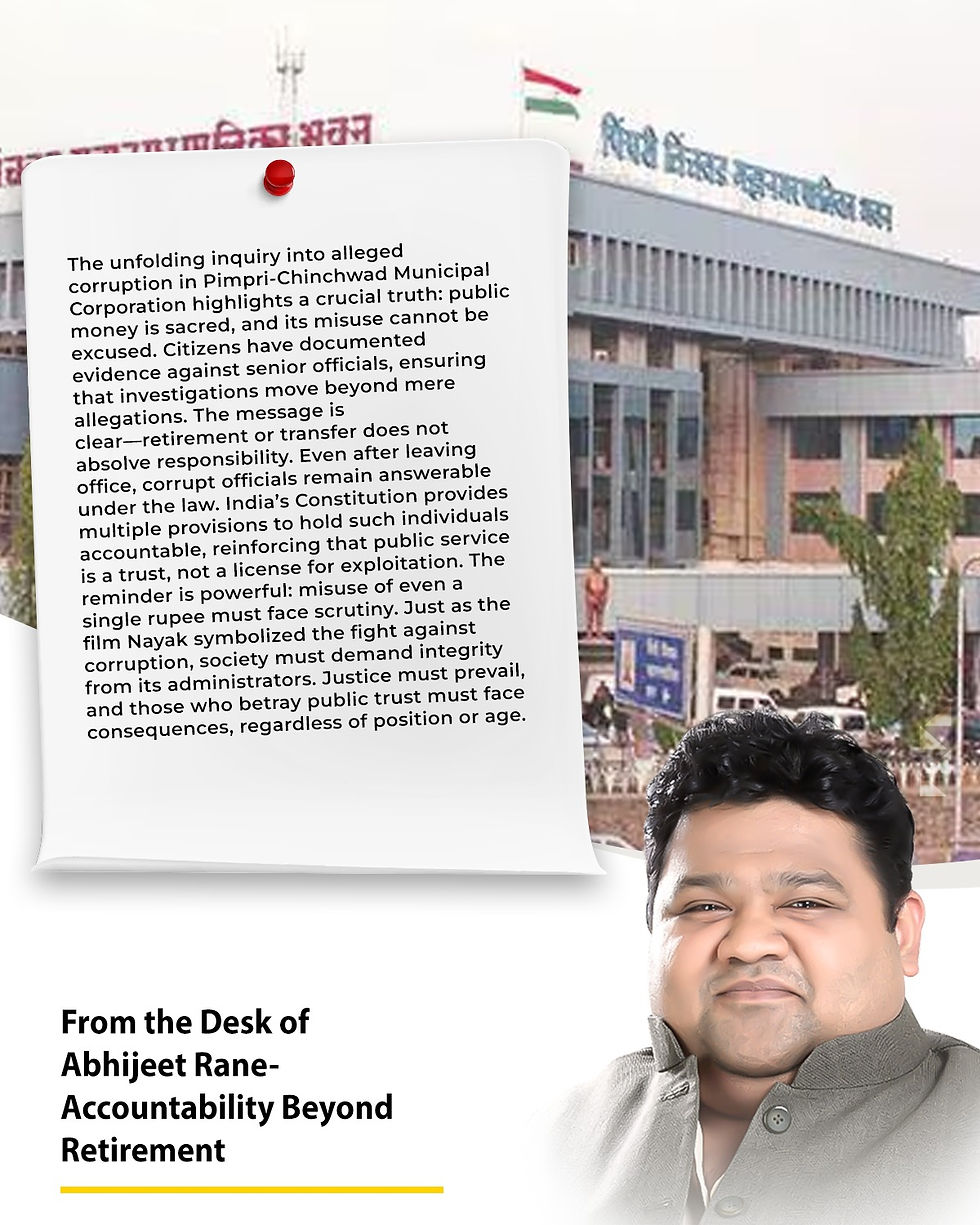🖋️ From The Desk of Abhijeet Rane
- dhadakkamgarunion0
- Nov 26, 2025
- 3 min read
🖋️ From The Desk of Abhijeet Rane
Discipline Above All in the Armed Forces.
The Supreme Court’s recent ruling upholding the dismissal of Christian army officer Samuel Kamalesan is a landmark affirmation of military discipline. Kamalesan had refused to participate in his regiment’s weekly religious parade, arguing against the practice. His challenge to the Delhi High Court’s earlier decision was rejected by a bench led by Chief Justice Surya Kant, reinforcing that the armed forces operate on collective duty and cohesion above individual preference.The judgment underscores that the military is not merely a workplace but an institution built on unity, tradition, and discipline. While freedom of faith is protected in civilian life, the armed forces demand adherence to practices that strengthen morale and solidarity. By prioritizing institutional integrity, the Court has sent a clear message: national defense requires discipline that transcends personal choices.
🔽
🖋️ From The Desk of Abhijeet Rane,
Stronger Shields Against Online Financial Fraud.
In a decisive step to protect consumers from rising online financial fraud, the government, RBI, and TRAI have introduced two major safeguards. First, all official bank websites will now carry the “.bank.in” domain extension—for example, hdfc.bank.in or idbi.bank.in. Any site without this extension should be treated as fake. This rule, effective from 31 October 2025, ensures that customers can easily identify genuine portals. Second, phone calls from banks and financial institutions will soon begin only with the prefix 1600. Calls from other numbers should be considered fraudulent attempts. Together, these measures aim to build trust, enhance transparency, and reduce the risk of scams that exploit digital platforms. By tightening digital identity markers, India is strengthening consumer confidence in its financial ecosystem.
🔽
🖋️ From The Desk of Abhijeet Rane
BJP’s Calculated Strategy in Mumbai.
As the Mumbai municipal elections approach, the BJP’s political maneuvering has left the Thackeray brothers caught in a carefully laid trap. What seemed like tactical moves by the Shiv Sena factions now appear to have eroded trust among both leaders and candidates. The electorate increasingly views the BJP as the party capable of delivering development, with expectations of defections rising once results are declared. Central to this strategy is Devendra Fadnavis, whose leadership continues to be underestimated at opponents’ peril. His ability to combine grassroots outreach with long-term planning has positioned the BJP as the dominant force in Maharashtra’s urban politics. The Thackeray brothers may realize too late that the BJP’s game was not about short-term gains but about reshaping alliances and consolidating power for the future.
🔽
🖋️ From The Desk of Abhijeet Rane
Criminalization of Local Politics
The growing criminalization of local elections in Maharashtra is a disturbing trend. Once considered training grounds for future legislators, municipal and panchayat polls are now increasingly dominated by muscle and money power. Builders, contractors, and local strongmen have realized that instead of funding politicians from behind the scenes, they can directly contest and wield influence themselves. This shift erodes the credibility of democratic institutions. The Vohra Committee in 1993 had already warned of the nexus between crime and politics, yet its report remains buried. Today, 41% of Maharashtra’s MLAs face criminal cases, raising the question: is Maharashtra becoming the very Bihar it once criticized? Unless voters decisively reject such candidates, tomorrow’s lawmakers will emerge from tainted backgrounds. For a just and safe Maharashtra, citizens must defeat criminal elements at the ballot box.
🔽
🖋️ From The Desk of Abhijeet Rane
Accountability Beyond Retirement
The unfolding inquiry into alleged corruption in Pimpri-Chinchwad Municipal Corporation highlights a crucial truth: public money is sacred, and its misuse cannot be excused. Citizens have documented evidence against senior officials, ensuring that investigations move beyond mere allegations. The message is clear—retirement or transfer does not absolve responsibility. Even after leaving office, corrupt officials remain answerable under the law. India’s Constitution provides multiple provisions to hold such individuals accountable, reinforcing that public service is a trust, not a license for exploitation. The reminder is powerful: misuse of even a single rupee must face scrutiny. Just as the film Nayak symbolized the fight against corruption, society must demand integrity from its administrators. Justice must prevail, and those who betray public trust must face consequences, regardless of position or age.
🔽
#ArmedForces #Discipline #SupremeCourt #CyberSafety #OnlineFraud #BankSecurity #DigitalIndia #BJP #MumbaiPolitics #Elections2025 #Governance #CrimeAndPolitics #Accountability #AntiCorruption #PublicService #MaharashtraPolitics #DevendraFadnavis #NarendraModi #AbhijeetRane








Comments